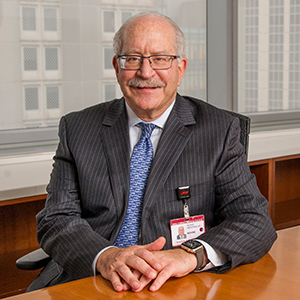Pneumococcal disease poses a considerable mortality and morbidity burden, especially in adults over 60 years of age. This is particularly the case for individuals with chronic lung, liver, or heart disease or diabetes, and those who are immunocompromised. Preventing infection and lowering the burden associated with pneumococcal disease is the focus of a number of national immunization programs and an area of ongoing research for Michael S. Niederman, MD, a pulmonary and critical care medicine specialist at NewYork-Presbyterian/Weill Cornell Medical Center.

Dr. Michael Niederman
Dr. Niederman has published more than 350 peer reviewed or review articles in the field, and has lectured widely, both nationally and internationally. Indeed, Dr. Niederman has participated in writing guidelines for pneumonia management on behalf of several national and international organizations. Recently he served as lead author in a literature review assessing the effectiveness and efficacy of the 23-valent pneumococcal polysaccharide vaccine (PPSV23) in adults 60 years and older. The review appeared in the March 2021 issue of Expert Review of Vaccines.
“Community-acquired pneumonia is the number one cause of death from infectious diseases, and the most common bacterial cause of community-acquired pneumonia is pneumococcal pneumonia,” says Dr. Niederman. “Since the 1980s, we’ve had vaccinations available for preventing pneumococcal pneumonia, but they’ve been grossly underutilized. Currently, there are two types of vaccination available – a polysaccharide vaccine, which includes 23 strains of the pneumococcal bacteria – recommended for anyone above the age of 65 and to certain high-risk individuals who are younger. It has been effective for preventing invasive bacteremic pneumococcal and non-invasive pneumococcal pneumonia. A second vaccine – the conjugate vaccine, which covers 13 strains – is a little bit more immunogenic than the polysaccharide vaccine.” Recently, the FDA approved two new conjugate vaccines, one that covers 15 strains and one that covers 20 strains, which were not included or considered in the published review by Dr. Niederman.
“In real-world effectiveness studies, the pneumococcal polysaccharide vaccine has been shown to be effective,” continues Dr. Niederman. “We were interested in expanding on this, so our review looked at the efficacy and effectiveness of PPSV23 from 2010 to 2020.”
According to the researchers, PPSV23 has been available since 1983, however, the vaccine has remained controversial, due partly to the variability of study endpoints and methods. In their review, they summarize findings of independent studies of the vaccine in the last decade that assess its effectiveness and efficacy in older adults and individuals who are at risk.
“In the United States, the Advisory Committee on Immunization Practices [ACIP] recently updated their recommendations for the polysaccharide vaccine and, in addition, advise that some immunocompromised individuals over the age of 60 also get the 13-strain conjugate vaccine,” continues Dr. Niederman. “In that case, the preference is to give the conjugate vaccine first because both vaccines seem to work better in that sequence. The most recent ACIP guidelines, published in January 2022, which include the new conjugate vaccines, also identify a role for PPSV23, particularly for those getting the 15 strain version.”
My message for doctors and their patients is that the pneumonia vaccination is very valuable, it’s very useful, it’s very effective.
— Dr. Michael Niederman
Among their findings, Dr. Niederman and his team report that PPSV23 is effective against vaccine-type invasive pneumococcal disease, although protection may be lower in individuals 75 years and older and those with underlying medical conditions. PPSV23 is also effective against vaccine-type noninvasive pneumococcal pneumonia and lowers the associated disease burden, as demonstrated in prospective and retrospective studies, but protection is dependent on vaccination about 5 to 10 years prior to disease onset.
“It’s a protective vaccine, but it’s not 100 percent protective, and makes some patients reluctant to take it,” says Dr. Niederman. “Even with effectiveness of 50 to 75 percent, they get discouraged if they hear of someone who had the vaccine and still got pneumonia. What we need to let them know is that the vaccine is very specific for a particular bacteria, but there are many types of bacterial and viral pneumonias. However, a vaccine that covers 23 different strains of a bacteria makes it more likely a patient would be protected than vaccines that cover fewer strains.”
The researchers maintain that despite the longstanding availability of PPSV23 in many countries, there remain significant gaps in its acceptance. In the United States, uptake of any pneumococcal vaccine (PPSV23 or PCV13) in 2017 was only 69 percent in adults aged 65 or older.
“In general, we rely on vaccinations to be helpful to prevent respiratory infections,” says Dr. Niederman. “My message for doctors and their patients is that the pneumonia vaccination is very valuable, it’s very useful, it’s very effective. The data that we just published is further confirmation of the efficacy and the effectiveness of the current vaccines.”



